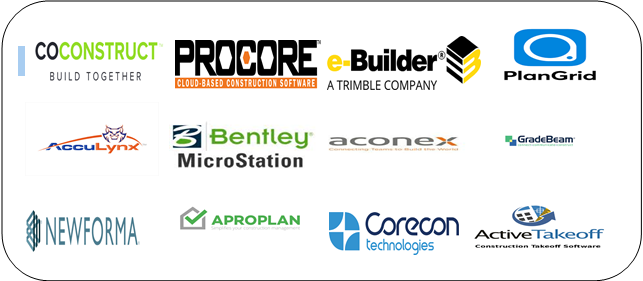
Introduction to Software for Construction Project Management
Not many have heard about the Software for Construction Project Management (CPMS), which is unknown. So, what is this software all about? “Software for Construction Project Management is a tool specifically designed for the construction industry professionals and is used to manage construction processes that were otherwise done manually”. Whether residential or commercial (government/private), the construction industry is a sector that requires proper organization and management. However, as several contractors from multiple companies with so many motile parts work together on a single construction project, an organization can be cumbersome. Here, CPMS serves the purpose.
Software for Construction Project Management Facilitates
- Efficient planning and management of construction projects.
- Detailed overview through Gantt charts
- Seamless coordination and collaboration.
- Efficient management of time.
- Easy tracking of any issues and prompt fixation.
- Management of documents.
Essential Attributes of Software for Construction Project Management
The software for Construction Project Management can differ from organization to organization, and its essential attributes are as below:
- Project Costing & Budgeting: This enables the contractors to estimate the material and labor cost, thus supporting the companies in setting standard rates for the services offered, measuring costs, and controlling the time expenses.
- Document Maintenance and Management: Being one of the key attributes, the ability of CPMS is to manage relevant documents. This allows the construction companies to create reports on workflow data through a single source. It thus helps in facilitating productivity and workflow processes. It also helps in integrating with other business tools and safeguarding information.
- Stock Management: This CPMS feature enables the management of inventory on the project site, curb any loss of stock, and help the project managers with quick inventories and distribution.
- Machinery Management: Construction cannot go without equipment’s and CPMS assists the project managers to manage and allocate machinery across projects. It helps in notifying on machinery maintenance and schedules, identifying installation of specific equipment, measuring performance efficacy, and sending out alerts on the requirement of any particular machinery.
- Work Scheduling: This feature enables in assigning of tasks, machinery, or manpower over multiple projects. It also helps in balancing the task loads and enabling immediate stabilization when required.
- Motile Access: Contrary to office-based industries, construction employees work on the field or project site and in the office. Therefore, motility is paramount as it enables the workers to access data from the construction site. This enables to efficiently manage time and resources without having to go to the office for any consultation. Thus, CPMS is required to support both desktop and mobile devices.
- Integration with Business Tools: The CPMS should offer the possibility of integration with other stand-alone applications, including solutions for fire prevention, accounting or reporting; otherwise, the transfer of information would consume a lot of time. Therefore, certain vendors offer modular software, which gives certain in-built functions with an option to add on extra features later.
- Field-Site Logs: It is important for the Software for Construction Project Management to record and keep logs of the tasks at the construction site. These logs help the project supervisors, contractors, or sub-contractors to keep track of the completed tasks, inventory, and machinery. Thus, it facilitates efficient workflow, less inventory waste, precision on purchase orders, avoidance of any loss of tool, or alert on any required tools to be moved to other project sites.
- Co-ordination and Collaboration: One of the critical features of the CPMS is to allow for real-time communication with the managers in the office and on-site workers. This helps to easily contact and locate site workers and notify them about any emergency with a click of a button. It facilitates better decision making and problem-solving. It allows for easy transfer and dissemination of information, thus notifying them about any emergency or about specific changes to be done.
Top Software for Construction Project Management at a Glance
Why does using CPMS could Benefit the Construction Companies?
Here are a few reasons why using Software for Construction Project Management could benefit the construction firms:
- Construction-Site Access: Most CPMS have virtual access from anywhere at any time. Therefore, this saves time, resources, facilitates quick and current information, and cuts down rush visits to the office.
- Better Team Coordination and Collaboration: CPMS facilitates easy communication with office managers and construction site professionals. This helps in enhancing smooth work processes, efficient communication and decision-making, notification and alerts on machinery and stock, prompt and accurate dispersal of information.
- Reduction of Manual Documentation: CPMS assists in reducing the otherwise mundane and time-consuming paperwork. As it improves access to all the project documentation, records, and the project task details for all the employees in the company.
- Reduction in Time and Inventory Wastage: CPMS allows the companies to disseminate information pertaining to stock, purchase order, deployment of machinery, monitoring, and recording of field tasks done. This allows the construction workers and the office managers to stay updated on any emergencies or notifications from both respective sides.
- Precise Monitoring: The CPMS has the ability to precisely monitor everything pertaining to the construction project. These include any information pertaining to the inventory stock, machinery, field-task records, project documentation, project scheduling, budgeting, and costing. This results in superior service delivery and efficient logistics management.
- Facilitates Communication between Off-site and On-site Employees: Unlike the other sectors, the construction sector requires the workers to work on-site. Thus, Software for Construction Project Management plays a vital role in facilitating communication between off-site and on-site employees. This helps in better management of workflow and promotes team-building. It also results in efficient time management and the transfer of any information or emergency promptly and balances the workload.
Considering its many benefits, it is definitely worthwhile for the construction companies to invest in Construction Project Management Software as per the firm’s requirement. And make the mundane construction tasks easier.
Conclusion
Now, as we are aware of the Software for Construction Project Management and its applicability, the popularity of the software is firm-specific. Therefore, the usage of construction software depends on how well the Software for Construction Project Management integrates with the firm’s existing software applications and tools.
Recommended Articles
This has been a guide to Software for Construction Project Management. Here we discussed the basic concept, essential attributes and how they will benefit the construction companies. You can also go through our suggested articles to learn more –

